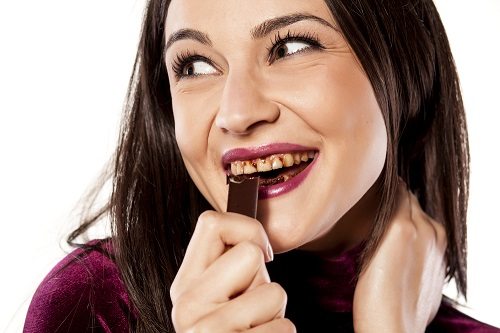
Your teeth can become discoloured because of surface stains or changes inside the tooth. When the outer layer of the tooth (the enamel) is stained, it’s an extrinsic discolouration. When the inner structure (the dentin) of tooth yellows or darkens, it’s an intrinsic discolouration.
There are a variety of causes of stained or discoloured teeth, some of which are preventable and some of which are treatable. Below we look at the most common causes of stained teeth and whether cosmetic dentistry can help.
- Getting Older
Your teeth start yellowing as a natural part of the ageing process. It happens due to a combination of extrinsic and intrinsic factors. Dentin naturally yellows over time while the enamel gets thinner due to everyday wear and tear on your teeth, allowing the colour of the dentin to show through.
- Smoking, Food and Drink
Smoking, as well as some food and drinks, discolour the enamel of the teeth. Anyone who smokes or consumes other tobacco products can expect their teeth to darken over time. Various food and drinks can have a similar effect. Common examples include coffee, tea, wine and cola.
- Poor Oral Hygiene
Poor oral hygiene allows plaque and tartar to build up. This quickens the discolouration of your teeth and causes a number of other dental problems. This can be avoided by brushing, flossing and rinsing on a daily basis with fluoridated products.
- Medication
Certain medications or medical conditions can discolour the dentin of your tooth. This type of discolouration can occur if:
- You used tetracycline antibiotics before the age of 8
- Your mother used tetracycline antibiotics during the second half of pregnancy
- You have received chemotherapy and/or radiation to treat cancer (causing more of a brownish colour)
- You use antihistamines, drugs for high blood pressure, and antipsychotic medication, some of which can stain adult teeth
- You had too much exposure to fluoride during early childhood
- You were born with a rare condition called dentinogenesis imperfecta, causing grey, amber or purple discolouration
Always review the potential side effects of medications you are currently or are about to start taking with your doctor.
- Trauma
Physical trauma from an accident can discolour teeth. This could be trauma in a permanent tooth, where internal bleeding discoloured the tooth, or trauma as a young child, which damages a developing tooth. Discolouration is especially prominent when the pulp (innermost layer) of the tooth has been damaged.
Treatment
Many extrinsic stains caused by food and drink can be removed through professional cleaning during your regular visit to the dentist. Good oral hygiene at home also helps remove these stains.
For more stubborn extrinsic discolouration, you can have your teeth professionally whitened. This is a good solution for severe discolouration from food, drinks, smoking and ageing. Keep in mind that whitening products available over the counter contain weaker bleach, which may not be as effective.
If you have an intrinsic discolouration, whitening won’t help. This will be the case with severe trauma or discolouration from medication or medical conditions. In these cases, your dentist may recommend covering the discoloured areas with veneers or crowns.
If you have discoloured teeth and would like to whiten them or improve their overall appearance, get in touch with our team. City Central Dental’s team of experienced cosmetic dentists can help you achieve a healthy, brilliant smile.
Book an appointment in Adelaide by calling 08 8231 9922 or contact us online.






































